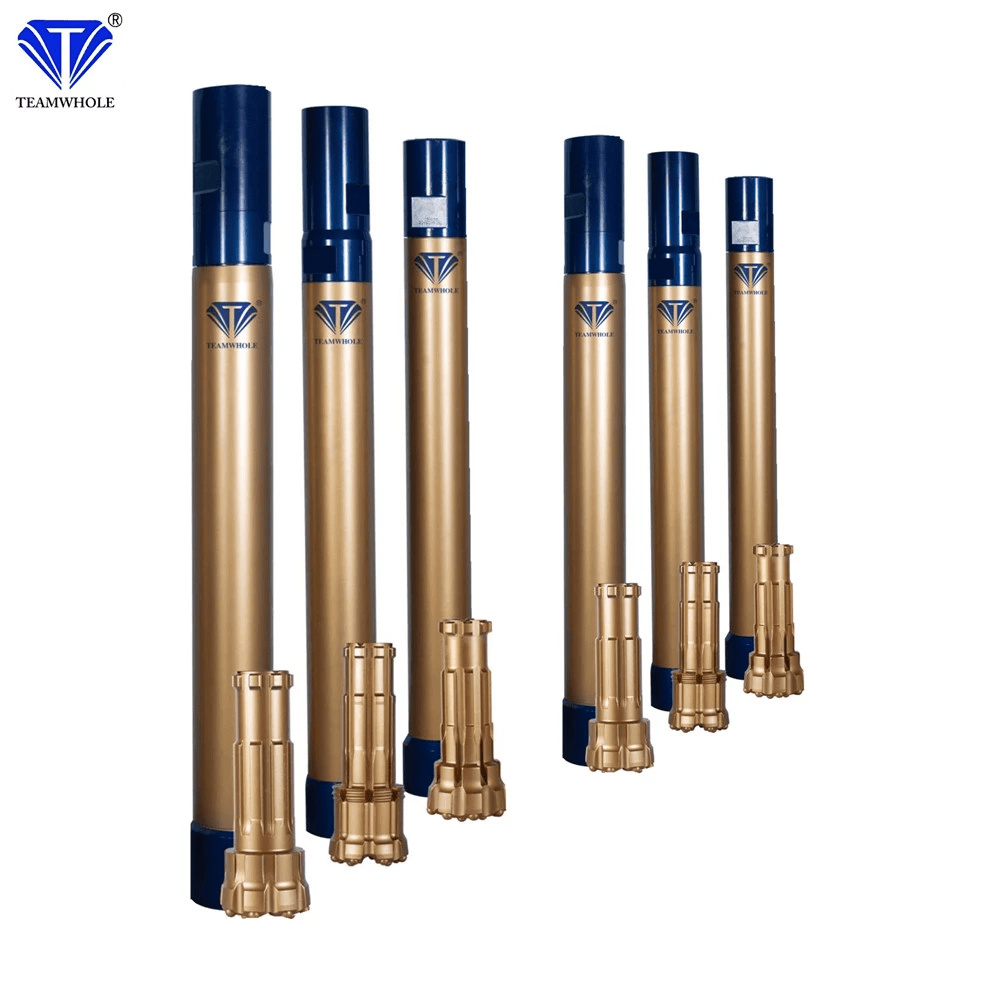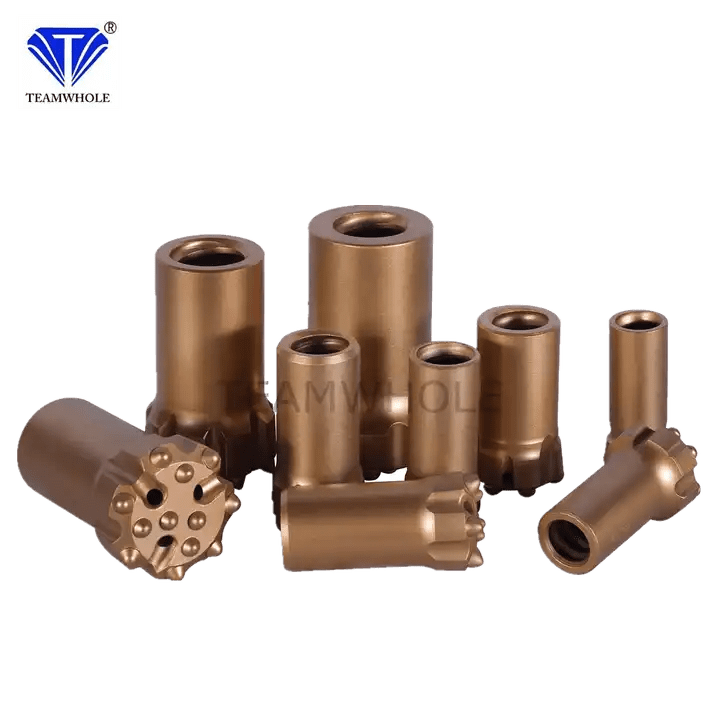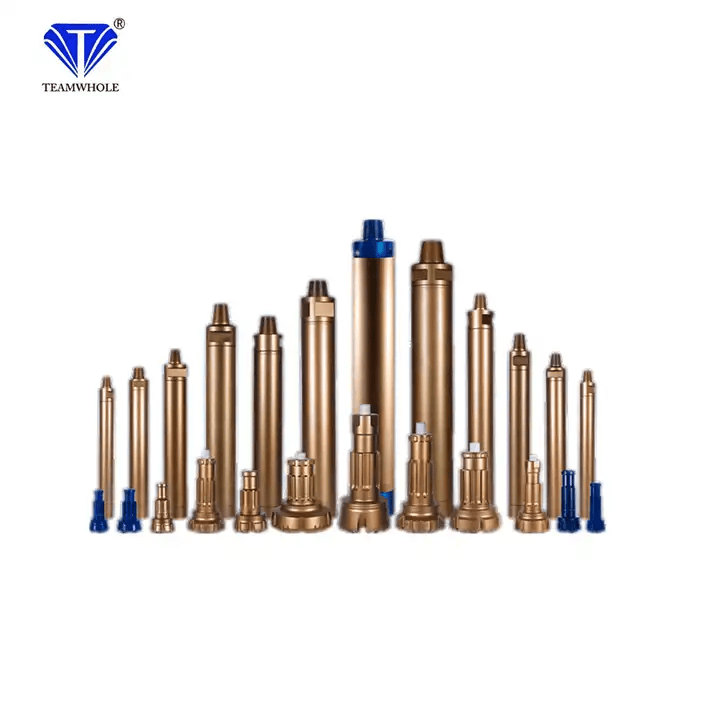Introduction

When it comes to drilling, Down-the-Hole (DTH) drilling tools have revolutionized the industry. But what exactly is DTH drilling? How does it differ from rotary drilling? And what are the unique features of down the hole hammers and bits? In this article, we'll explore the world of DTH drilling and uncover the advantages of using DTH drills in various applications.
What is DTH Drilling?
DTH drilling, also known as Down-the-Hole drilling, is a method used to drill boreholes into the earth's surface. This technique involves a hammer that is located behind the drill bit and is powered by compressed air. The hammer directly strikes the drill bit, creating a powerful impact that allows for efficient and precise drilling.
DTH drilling is often favored over rotary drilling for its ability to penetrate hard rock formations more effectively. This method is also preferred when precision and accuracy are crucial, as the hammer impact allows for a controlled and consistent drilling process. Additionally, DTH drilling is known for its faster penetration rates, making it a time-efficient option for various drilling projects.
The Difference Between Rotary and DTH
While rotary drilling is effective in softer ground conditions, DTH drilling excels in hard rock formations, making it a versatile option for various geological challenges. This adaptability allows for increased efficiency and cost-effectiveness in a wide range of drilling projects, from mining to construction. Additionally, the percussive action of DTH drilling reduces the risk of getting stuck in challenging formations, minimizing downtime and maximizing productivity.
Down-the-Hole Drilling Tools Explained
Down-the-hole drills consist of various components such as hammers, bits, and pipes that work together to create boreholes. The hammer delivers rapid blows to the bit, while air pressure removes debris from the hole. These tools are designed to withstand high-impact forces and provide exceptional performance in challenging environments.
Down-the-hole drilling tools are essential for various industries such as mining, construction, and oil and gas exploration. These tools are versatile and can be used for a wide range of applications, from creating blast holes in quarries to installing water wells. The ability to withstand high-impact forces makes down-the-hole drills a reliable choice for demanding projects, ensuring efficient and precise drilling operations.
Understanding Down-the-Hole Drilling

When it comes to DTH drilling, understanding how down the hole drills work is crucial. These powerful tools are designed to deliver maximum impact energy directly to the drill bit, making them highly efficient for various drilling applications. Unlike rotary drilling, where the bit is rotated and the rock is crushed by the bit's teeth, DTH drills use a hammering action to break through hard formations.
How DTH Drills Work
DTH drills work by using compressed air to drive a piston that strikes the drill bit at the bottom of the hole. This impact creates fractures in the rock, allowing for faster and more precise drilling. The cuttings are then flushed out of the hole by the air, ensuring that there is no build-up of debris that could hinder progress.
DTH drilling also offers the advantage of being able to drill through a variety of rock types, including hard and abrasive formations. This versatility makes DTH drilling a popular choice for mining, construction, and quarrying operations where different types of rock may be encountered. Additionally, the precision of DTH drilling allows for more accurate hole placement, reducing the need for additional reworking or adjustments.
Advantages of Down-the-Hole Drilling
The advantages of using down-the-hole drilling tools are numerous. They offer faster penetration rates and lower energy consumption compared to other methods, making them ideal for large-scale projects. Additionally, DTH drills are versatile and can be used in a wide range of geological formations, from soft soil to hard rock.
Moreover, DTH drilling tools are known for their accuracy and precision, allowing for more controlled and targeted drilling. This is especially beneficial in urban areas or sensitive environments where minimizing disruption and avoiding damage to surrounding structures is essential. Additionally, the ability to easily adjust the angle and direction of drilling makes DTH drills well-suited for complex projects that require precise navigation through challenging geological formations.
Core Keywords Integration in DTH Drilling
Incorporating core keywords such as down the hole hammers and DTH drilling tools into your content is essential for boosting visibility and reaching your target audience. By strategically integrating these keywords into your content, you can ensure that your message resonates with those seeking information about down-the-hole drilling methods and equipment.
In addition to boosting visibility, integrating core keywords like down the hole hammers and DTH drilling tools into your content can also help establish your expertise in the field of drilling technology. By incorporating these keywords strategically, you can position yourself as a go-to resource for those seeking information on DTH drilling methods and equipment. This can ultimately lead to increased trust and credibility among your target audience.
Explaining DTH Drilling Techniques

DTH drilling techniques involve using down the hole drills to penetrate rock formations. This method is highly efficient and precise, making it a popular choice in various industries. The process of down-the-hole drilling involves using specialized DTH drilling tools to create boreholes for mining, construction, and water well drilling.
The Process of Down-the-Hole Drilling
The process of down-the-hole drilling begins with the insertion of the DTH drill bit into the borehole, followed by the application of high-pressure air or other fluids to propel the drill bit into the rock formation. As the drill bit rotates and hammers against the rock, it creates a clean and precise borehole, making it an ideal method for various applications.
After the borehole is drilled, the DTH drilling tools are then removed from the hole, leaving behind a clean and precise opening. This method is highly efficient and produces minimal waste, making it an environmentally friendly option for drilling operations. Additionally, the ability to drill at various angles and depths makes down-the-hole drilling tools versatile and suitable for a wide range of applications.
Unique Features of DTH Drilling Tools
DTH drilling tools are designed with unique features that make them highly effective in penetrating hard rock formations. These tools are equipped with down-the-hole hammers and bits that deliver powerful impact force to efficiently break through challenging geological formations. Additionally, DTH drills are capable of achieving greater depths compared to traditional rotary drilling methods.
Furthermore, DTH drilling tools are known for their precision and accuracy, allowing for more controlled drilling operations. This level of control is essential when working in challenging environments where the slightest deviation can lead to costly mistakes. The innovative design of DTH drilling tools also minimizes the risk of hole deviation, ensuring that the desired depth and trajectory are achieved with minimal disruption.
TEAMWHOLE's Innovative DTH Drilling Solutions
TEAMWHOLE offers innovative DTH drilling solutions that are designed to optimize performance and productivity in various drilling applications. Their advanced down-the-hole drilling tools are engineered with cutting-edge technology to ensure superior penetration rates and extended tool life, providing cost-effective solutions for mining, construction, and water well drilling projects.
In addition, TEAMWHOLE's DTH drilling solutions are designed to minimize downtime and maximize efficiency, allowing for continuous operation and reduced overall project timelines. The reliability and durability of their tools ensure that drilling operations can proceed smoothly without frequent interruptions for maintenance or tool replacement. This translates to significant cost savings and increased profitability for businesses in the mining, construction, and water well drilling industries.
Benefits of Using Down-the-Hole Drilling Tools

Efficiency of DTH Drills in Mining
One of the key benefits of using down the hole drills in mining is their efficiency in reaching deeper into the earth's surface compared to traditional rotary drilling methods. DTH drilling tools are able to penetrate hard rock formations with ease, making them ideal for mining operations that require precise and powerful drilling.
Furthermore, DTH drills are known for their ability to maintain hole straightness, resulting in more accurate and efficient drilling. This precision is crucial in mining operations where specific angles and depths need to be achieved. Additionally, DTH drilling methods produce less waste compared to traditional drilling methods, making them a more environmentally friendly option for mining companies. This reduction in waste also leads to cost savings for the operation as a whole.
Water Well Drilling with DTH Methods
When it comes to water well drilling, DTH methods offer significant advantages over other drilling techniques. Down-the-hole drilling tools are capable of delivering high-performance results in various geological conditions, ensuring reliable and efficient water well construction. This makes them a preferred choice for ensuring access to clean and sustainable water sources.
In addition to their efficiency in water well drilling, DTH methods are also highly effective in foundation construction. The ability of down-the-hole drilling tools to deliver high-performance results in various geological conditions makes them an ideal choice for creating strong and reliable foundations. Whether it's for residential, commercial, or industrial construction projects, the use of DTH methods ensures that the foundations are built to last, providing stability and durability for the structures above.
Foundation Construction with Down-the-Hole Drilling
In foundation construction, down-the-hole drilling provides unmatched precision and speed, allowing for the creation of strong and stable foundations for buildings and infrastructure projects. DTH drilling tools enable accurate placement of piles and anchors, resulting in durable foundations that can withstand the test of time.
Conclusion

Now that you understand the ins and outs of DTH drilling, it's clear that down the hole hammers and bits play a crucial role in this method. These tools are specifically designed to withstand the high impact and abrasion of DTH drilling, providing efficient and reliable performance for various applications.
Down the Hole Hammers and Bits Explained
Down the hole hammers and bits are essential components of DTH drilling tools, as they deliver powerful percussion to break through rock formations. The hammers are fitted with piston-driven mechanisms that transfer energy to the drill bit, allowing for efficient penetration into hard surfaces. This means that DTH drilling tools are highly effective for mining, construction, and oil and gas exploration, where rock formations can be particularly challenging to penetrate.
Advantages of TEAMWHOLE's DTH Drilling Tools
TEAMWHOLE's DTH drilling tools offer unparalleled durability and performance, ensuring optimal results in mining, water well drilling, and foundation construction projects. With advanced engineering and precision manufacturing, these tools provide exceptional reliability and longevity in demanding drilling environments.
In addition to their durability and performance, TEAMWHOLE's DTH drilling tools are designed for easy maintenance and repair, minimizing downtime and maximizing productivity on the job site. With user-friendly features and a focus on accessibility, these tools make it simple for drilling operators to keep equipment in top condition, reducing overall costs and increasing efficiency. This emphasis on practicality sets TEAMWHOLE apart as a leader in providing reliable drilling solutions.
Choosing the Right Down-the-Hole Drilling Method
When it comes to selecting a drilling method, considering factors such as rock hardness, depth requirements, and project scope is crucial. By understanding the unique advantages of DTH drilling tools, you can make an informed decision on whether this method is best suited for your specific drilling needs.

